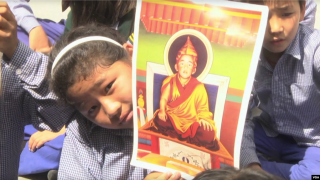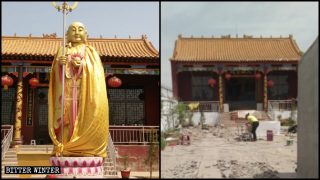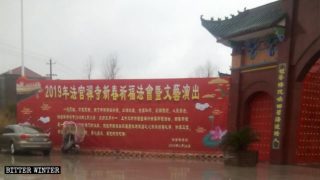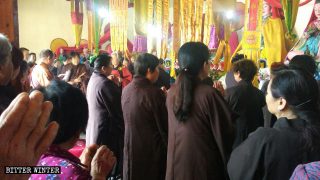The government orders to change the appearance of temples, prohibits religious words and traditional ceremonies. Some believers end up in police custody.
by An Xin
If the CCP’s crackdown on Christianity is waged in the name of “de-Westernization,” and the suppression of Islam as the fight against “terrorism and radicalism,” no clear-cut reasoning has been provided for the regime’s ever-increasing persecution of China’s traditional religions – Buddhism and Taoism. For now, the repressions, most probably, are under the general target of eliminating anything related to religion in China.
Word “temple” not allowed
Residence of Dengfeng city in the central province of Henan recently witnessed how the Chinese character for “temple” had vanished from the name of the locally-renowned “Shaolin Temple Tagou Martial Arts School.” The name of the school on the backs of old students’ uniforms has been covered with a red cloth or a Chinese flag as well. The newly-issued outfits don’t have the word “temple” in the school name on them anymore.
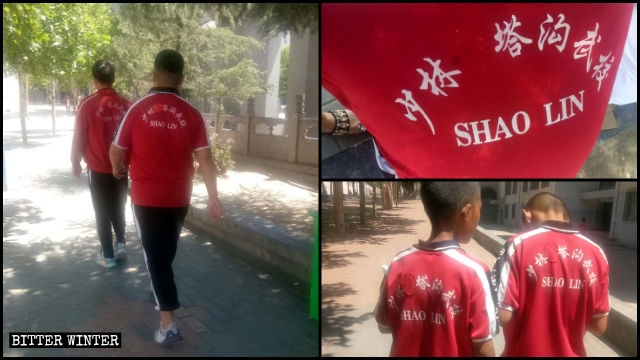
“The principal and our coach told us to cover it. If it were discovered that we didn’t, we would be criticized,” a student explained. The measures were implemented in May after the state had issued requirements to remove all religion-related words. That’s what the student’s coach told them. “The state wants to eliminate religious belief completely,” added the student.
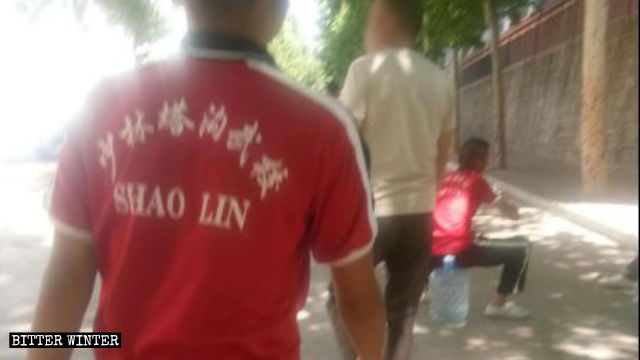
Taoist temples painted gray
Shangyuan Temple, a Taoist temple located in Chenggu county under the jurisdiction of Hanzhong city in the northwestern province of Shaanxi, was once bright red but has now been turned completely gray.
The government gave two reasons for the requirement of color change: First, the temple was too conspicuous, “overshadowing the government’s limelight.” Second, since the temple was rebuilt in 2018 as a replica of the original place of worship, the building cannot be red but must be gray. This is in line with the regulations governing the current crackdown on religion, the officials explained.
“If it’s conspicuous and easy for people to see, lots of them will come to the temple. The higher-ups demanded us to change the color. There was nothing we could do about it,” said a local government insider.
The change of color did not ensure the safety for the temple: it might still be forcibly demolished, the officials warned.
According to local residents, several Taoist temples have been demolished in the surrounding area. “The town of Shangyuanguan is named after this Taoist temple. The temple is located at the entrance to the town, and it is part of the town’s image. Now it is gray and lifeless; it looks nothing like a Taoist temple,” the residents complained, calling the government’s decision unreasonable. They believe that the temple has been repainted purely to restrict religious belief.
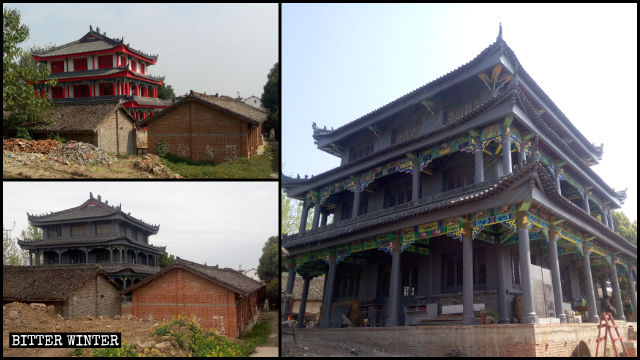
In the southeast coastal province of Fujian, Wenchang Palace and Longxing Temple, both located near the Olympic Sports Center in the capital Fuzhou, as well as Sansheng Palace and Zunwang Temple in the city’s Cangshan district, were also changed in appearance under the government’s mandatory requirements.
Wenchang Palace and Longxing Temple were originally built during the Ming Dynasty (1368-1644), and have a history spanning half a millennium. Five years ago, they were rebuilt after expropriation in a new location. The new temples barely remind of Taoist places of worship from the outside.
“They look like a warehouse. We can’t alter their appearance even the slightest bit,” complained a local believer. “If we change anything, the Urban Management Bureau will come after us. Patrol officers also come for frequent inspections to see whether we altered their exterior appearance, and will report any changes that they discover. As ordinary people, there is nothing we can do, just suffer in silence!”
“No one dares to sue the government. If the government wants to give you a hard time, it will bring in an excavator and tear your temple down,” added another local Taoist. “When the time comes, even these modified temples will disappear. We’re members of the Taoist Association, but they still suppress us like this. Taoism is a religion of China, yet the government still doesn’t allow it.”
Taoists at Zunwang Temple complained that the authorities didn’t let them keep the traditional temple style and required to paint it gray, saying that it was a political issue. Now, people who do not know about its existence cannot tell that this is a temple. Moreover, it’s surrounded by trees, so it is barely visible.
Any gathering of believers deemed “illegal activity”
Last November, a Buddhist from Liaoyang city in the northeastern province of Liaoning invited some fellow believers to a restaurant to thank them for their help during her stay in hospital. During the meal, all of a sudden, dozens of police officers surrounded them, claiming that they were holding an “illegal gathering.” At least seven persons were arrested, their homes searched. Based on the faith-related materials found during the searches, some of these Buddhists were detained for periods ranging from three to 15 days.
In March, seven Buddhists in the northeastern province of Heilongjiang dressed up in traditional Han Chinese attire to celebrate the birthday of Guanyin – the Goddess of Mercy. They danced in front of the shop of a Buddhist believer, afterward, went to a nearby river to free captive fish – a traditional Buddhist ceremony to show compassion. Passersby captured their activities on videos that were later posted online, and the number of views quickly soared to more than 7,000.
This matter has caught the attention of officials from the local Religious Affairs Bureau and county government, who claimed that the Buddhists were receiving too much attention, which had an “adverse impact” on the population. As a result, they prohibited the local Buddhists from carrying similar religious activities in the future and demanded to remove the videos from the internet.
“The control is very rigorous now, just like during the Cultural Revolution. Whatever crime they say you committed, you’re automatically deemed guilty. The government is just afraid of crowds gathering,” commented a local resident.
Source:BITTER WINTER/An Xin
